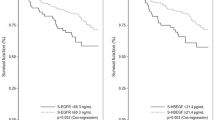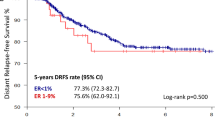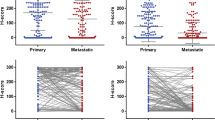Abstract
More accurate criteria are required for the selection of patients with node-negative breast cancer for systemic adjuvant therapy. Expression of epidermal growth factor receptor (EGFr) has been shown previously to be inversely related to oestrogen receptor (ER) in patients with operable breast cancer and to be associated with a poorer prognosis. Analysis of EGFr and ER was performed on tumour samples from 231 patients with operable breast cancer followed for up to 6 years after surgery. The median duration of follow-up in patients still alive at the time of analysis was 45 months. Thirty-five percent of patients (82) had tumours with greater than 10 fmol mg-1 I125-EGF binding (EGFr+) and 47% (109) and cystolic ER concentrations greater than 5 fmol mg-1 (ER+), with a marked inverse relationship between EGFr and ER (P less than 0.00001). In a univariate analysis EGFr was second only to axillary node status as a prognostic marker for all patients both in terms of relapse-free and overall survival (P less than 0.001, log rank). For patients with histologically negative axillary nodes EGFr was superior to ER in predicting relapse and survival (P less than 0.01 and P less than 0.005 respectively compared to P less than 0.1 and P less than 0.1, log rank). In a multivariate (Cox model) analysis only EGFr, out of EGFr, ER, size and grade, was predictive for either relapse-free or overall survival for patients with node-negative disease (P = 0.05 and P = 0.026 respectively). EGFr has been shown to be a marker of poor prognosis for patients with node-negative breast cancer. Since patients with EGFr+ tumours are unlikely to respond to hormone therapy it may be possible to select them for trials of systemic adjuvant chemotherapy.
This is a preview of subscription content, access via your institution
Access options
Subscribe to this journal
Receive 24 print issues and online access
$259.00 per year
only $10.79 per issue
Buy this article
- Purchase on Springer Link
- Instant access to full article PDF
Prices may be subject to local taxes which are calculated during checkout
Similar content being viewed by others
Author information
Authors and Affiliations
Rights and permissions
About this article
Cite this article
Nicholson, S., Richard, J., Sainsbury, C. et al. Epidermal growth factor receptor (EGFr); results of a 6 year follow-up study in operable breast cancer with emphasis on the node negative subgroup. Br J Cancer 63, 146–150 (1991). https://doi.org/10.1038/bjc.1991.30
Issue Date:
DOI: https://doi.org/10.1038/bjc.1991.30
This article is cited by
-
UCHL1 as a novel target in breast cancer: emerging insights from cell and chemical biology
British Journal of Cancer (2022)
-
Upregulation of Claudin-4, CAIX and GLUT-1 in distant breast cancer metastases
BMC Cancer (2014)
-
The effects of DNA formulation and administration route on cancer therapeutic efficacy with xenogenic EGFR DNA vaccine in a lung cancer animal model
Genetic Vaccines and Therapy (2009)
-
A simple and reproducible scoring system for EGFR in colorectal cancer: application to prognosis and prediction of response to preoperative brachytherapy
British Journal of Cancer (2007)
-
Recognition and capture of breast cancer cells using an antibody-based platform in a microelectromechanical systems device
Biomedical Microdevices (2007)



